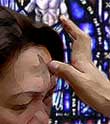The Lenten Season

Lent Begins: Ash Wednesday March 09, 2011
The Lenten Season or Lent refers to the forty-day period leading up to the holiday of Easter. Lent begins on Ash Wednesday, the seventh Wednesday before Easter, and ends the Saturday before Easter Sunday.
Lent is considered a time of fasting, repentance and deep soul searching. The heaviness of Lent is lifted each Sunday, since Sunday is the day on which Jesus was resurrected and is therefore considered a “mini”-Easter.
A quick counting reveals that there are actually 46 days between Ash Wednesday and Easter. However, Sundays are not counted in the total since they are considered a celebratory day. Their removal results in the 40 days – rather than 46 days – of Lent.
The origins of Lent can be traced back to the footsteps of Jesus, who spent 40 days wandering in the desert wilderness, facing temptations from Satan. Jesus is believed to have overcome the devil’s temptations through fasting and sincere repentance.The Significance of Forty
Forty is also a significant number throughout Judeo-Christian tradition. The Jewish people are said to have spent forty years wandering in the desert after escaping slavery in Egypt before they entered the Promised Land. During their sojourn, Moses is believed to have received the Ten Commandments on Mount Sinai – but only after he spent 40 days alone on the mountain.
In the Book of Jonah, the prophet gave the evil-doers of Nineveh forty days to repent their sins before God would destroy them. Likewise, sins led God to bring the great flood of forty days and forty nights, which Noah, his family and his fleet of paired animals survived on an ark.
Lent Practices and Traditions
While not scripturally proscribed, Lent has been practiced for over two thousand years, since the earliest days of the Church. The first Christians understood Lent as a period of preparation for Easter. Faithful followers re-devoted themselves through fasting and repenting for their sins. Many converts to Christianity were also baptized during the Lenten season.
Today, Christians vow to give up something of temporal significance in lieu of actual fasting. In Roman Catholic tradition, meat and chicken are not eaten during Lent. In Protestant tradition, followers will often give up something they consider a vice – junk food, cable TV or anything else blocking their focus on true repentance.
The other customs of Lent include increased commitment to prayer, particularly repentance, and almsgiving. A number of churches focus on increased tithing during the Lenten season.
The Days of Lent
The days of Lent are set in relationship to Easter, which falls on the first Sunday after the full moon of the spring equinox -sometime between March 22 and April 25. The forty days of Lent (not including Sundays) are counted backward from Easter.
Ash Wednesday is the first day of the Lenten season, commemorated by priests, ministers and (Roman Catholic) parishioners who mark their foreheads with ashes to remind themselves that they were created from – and will be returned to – dust.
In many cultures, the day before Ash Wednesday is also a special day, marked by a boisterous festival, such as Mardi Gras in New Orleans, Fat Tuesday in France, and Carnival in Brazil. In fact, in Latin, the word Carnival means “farewell to meat” – significant since Catholics abstain from eating meat during Lent.
The fifth Sunday of the Lenten Season is known as Passion Sunday and marks the beginning of the Passiontide, or the two weeks leading up to Easter Sunday. Palm Sunday is the sixth Lenten Sunday, and marks the start of Holy Week, or the final week of Lent before Easter.
During Holy Week, prayer, repentance, almsgiving and fasting are said to increase in fervor and impact. The Wednesday of Holy Week is known as Spy Wednesday, which remembers Judas spying on Jesus before he betrayed him.
The Thursday before Easter is called Maundy or Holy Thursday, and commemorates Jesus’ Last Supper with his disciples. In Roman Catholic tradition, Holy Thursday also marks the beginning of the three-day Easter Mass.
Two days before Easter, Good Friday marks the anniversary of Jesus’ crucifixion and his burial.
Churches hold Easter vigils beginning on Holy Saturday or the morning of Easter Sunday, depending on the church. The culmination of the Lenten Season is the Easter Sunday, which is religiously marked by mass or Sunday service and an Easter feast, as well as the more commercial visit to the Easter bunny and Easter egg hunt.
When does Lent begin? (When is Ash Wednesday?)



